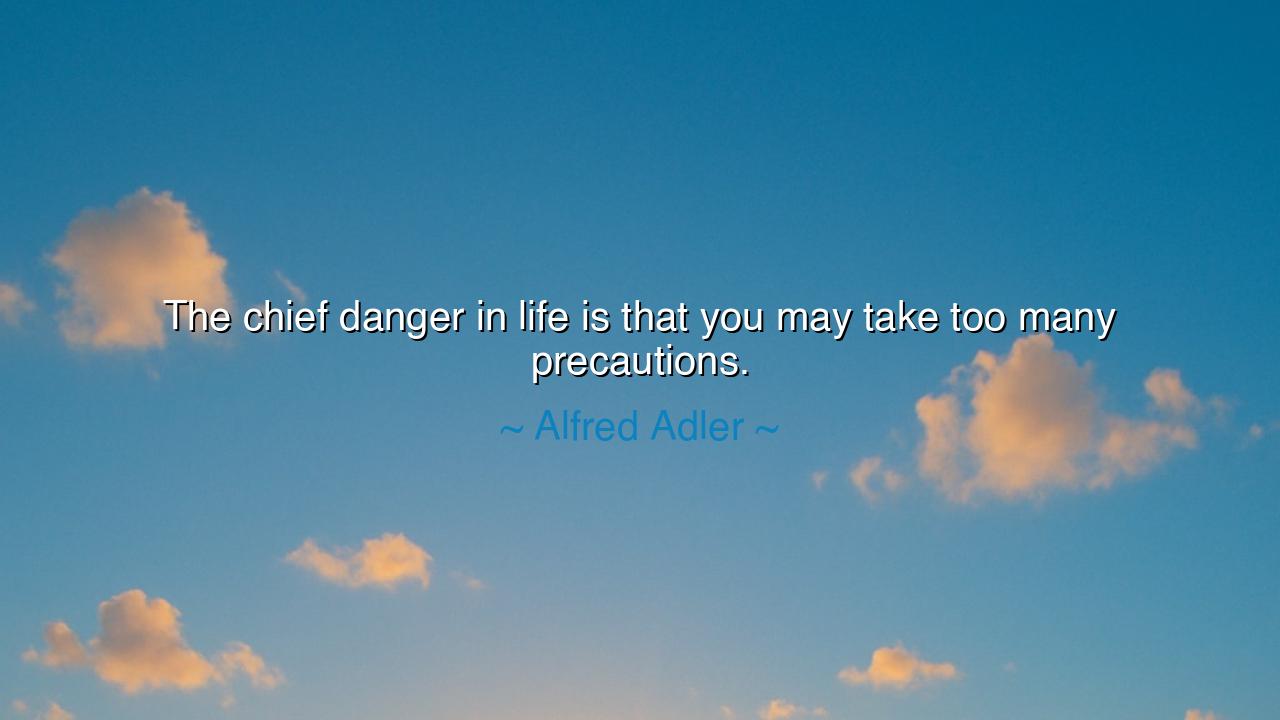
The chief danger in life is that you may take too many






“The chief danger in life is that you may take too many precautions.” – Alfred Adler
In these words, Alfred Adler, the wise physician of the human soul, strikes at the heart of our mortal hesitation. For he saw that the greatest peril is not found in storm or sword, nor in the cruelty of fate, but in the timid spirit that fears to live. The chief danger is not death, nor failure—it is the slow death of the heart that dares nothing, risks nothing, and so gains nothing. When man builds too many walls of caution around himself, he may protect his body, but he imprisons his soul.
From the ancient world we learn that life favors the bold. The Greeks spoke of the hero’s journey, where each man must face his trials or perish in the shallows of comfort. Odysseus did not remain in Ithaca fearing the sea; he ventured forth and found wisdom through struggle. So too did every great soul of history learn that safety is an illusion—a golden chain that binds the free. To take too many precautions is to bow before the ghost of fear, offering one’s potential as sacrifice to its shadowy altar.
There is a tale of a young emperor in China, whose astrologers warned him of danger in the world beyond his palace walls. So he built towers, moats, and gates; he surrounded himself with guards and servants sworn to protect him. Years passed, and though no blade or poison touched him, his spirit grew weary and pale. He had evaded the perils of life, but he had also evaded life itself. When at last he looked upon the setting sun and felt no joy, he understood Adler’s truth—to live too safely is the most dangerous life of all.
Even in modern times, we can see this lesson play out. Consider the inventor or the artist who hides his work for fear of failure. He takes precautions—he waits for a “better moment,” he fears ridicule, he builds excuses instead of dreams. Yet history remembers not the cautious, but the courageous. It remembers the Wright brothers, who risked their lives to teach humanity to fly; it remembers Rosa Parks, who defied fear to stand for dignity. Each of them might have said, “I must be careful,” and the world would have remained smaller for it.
The words of Adler are a call to arms for the spirit. They remind us that security is not the same as peace, and that excessive caution breeds decay. To walk always upon safe roads is to never find new lands. The man who risks, though he may stumble, lives a hundred lives; the one who avoids all danger dies before his time, untouched but unfulfilled. As the ancients said, “Fortune favors the brave,” for the gods themselves seem to delight in those who dare.
Let us therefore not mistake prudence for fear. It is wise to prepare, but fatal to never begin. Build your ship well—but then sail it into the open sea. Love deeply, even knowing loss may come. Speak your truth, even if the world frowns. Create, strive, and leap into the unknown, for only in movement do we find meaning. The greatest danger is not that we may fall, but that we may never rise.
So, my child of tomorrow, take this lesson to heart: life is not meant to be survived—it is meant to be lived. Guard your soul from paralysis disguised as caution. Let your courage burn brighter than your doubt, and when you stand before the crossroads of choice, choose the path that stirs your heart. For every heartbeat is a summons to adventure, and he who answers it becomes truly alive.






AAdministratorAdministrator
Welcome, honored guests. Please leave a comment, we will respond soon